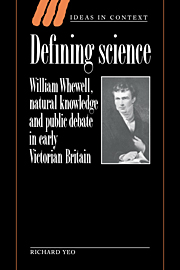5 - Moral scientists
Published online by Cambridge University Press: 22 August 2009
Summary
I never heard of any mathematician who was a sceptic in astronomy or physics; and yet, there are few branches of knowledge which lie more open to metaphysical quibbles.
Dugald Stewart (1854–60) [1827], III, 207Dined with Whewell to meet Arago … [who] told us anecdotes of Laplace … [including one about his dismissal of any hypothesis of a Deity]. LaPlace called on Arago begging him to omit this anecdote as the phrase might do him hurt, he wd not however deny it.
Romilly's Cambridge Diary, Friday 26 September 1834, Bury 1967, 61One mark of the consolidation which had taken place in the status of science during the nineteenth century was the ability of Francis Galton to single out English men of science as a distinctive group for psychological study. In 1874 Galton inquired into the nature and nurture of this group and felt reasonably confident that he had isolated a significant cluster of attitudes and aptitudes common to such individuals. He did not, however, ‘attempt to define a “scientific man”’ since, as he said, such groups always blend into others. Thus the traces of the earlier problematic profile of men of science remained: Galton remarked, for example, that: ‘Some of my readers may feel surprise that so many as 300 persons are to be found in the United Kingdom who deserve the title of scientific men’ (Galton 1874, 6–7).
- Type
- Chapter
- Information
- Defining ScienceWilliam Whewell, Natural Knowledge and Public Debate in Early Victorian Britain, pp. 116 - 144Publisher: Cambridge University PressPrint publication year: 1993

